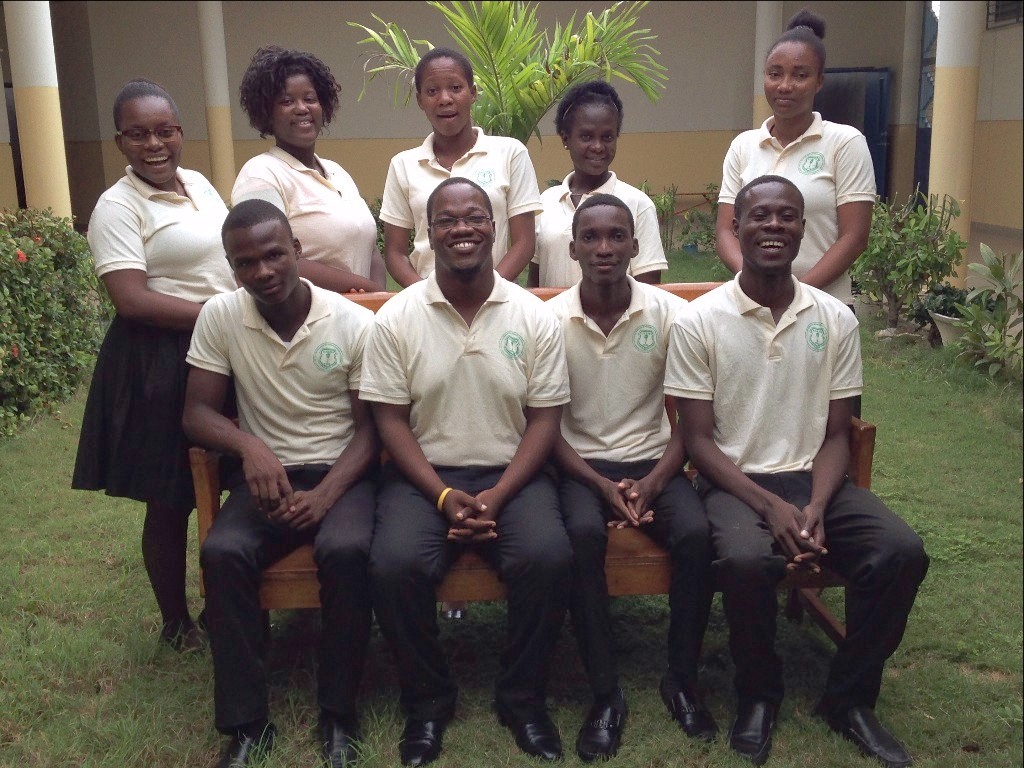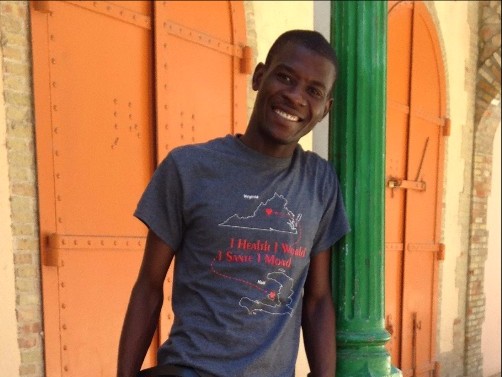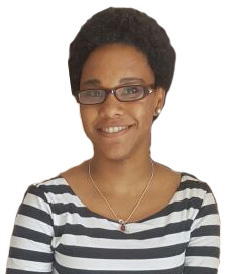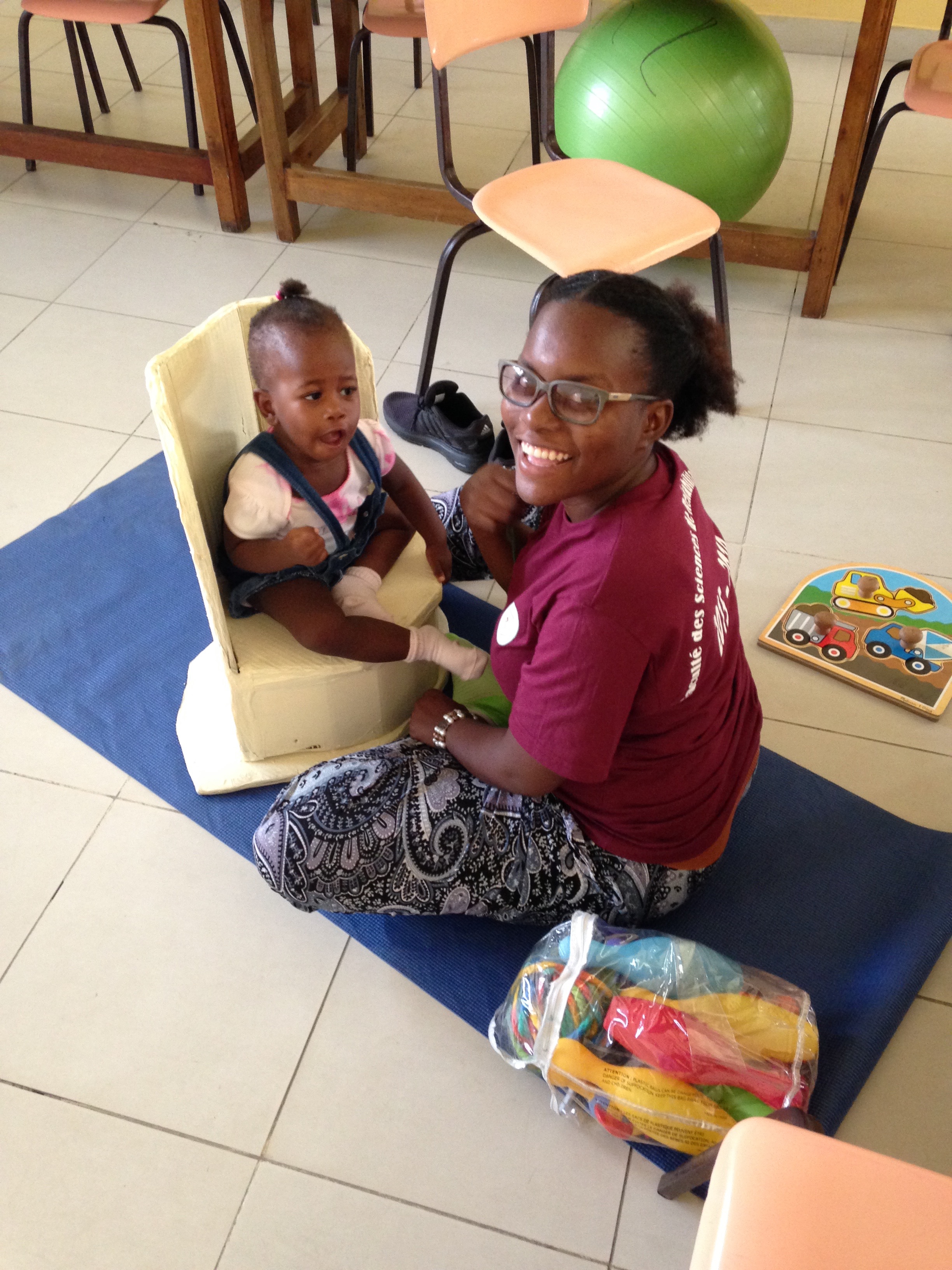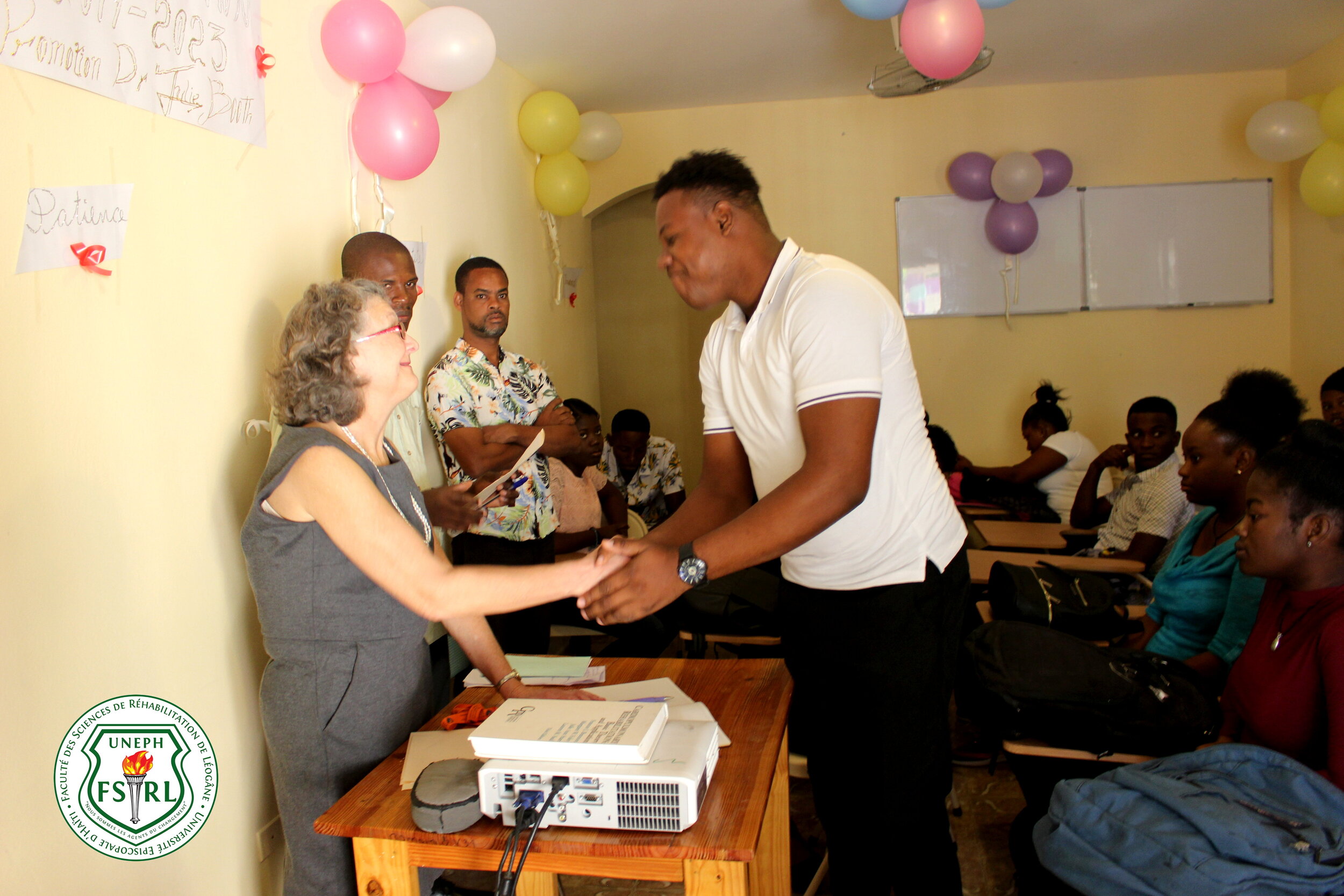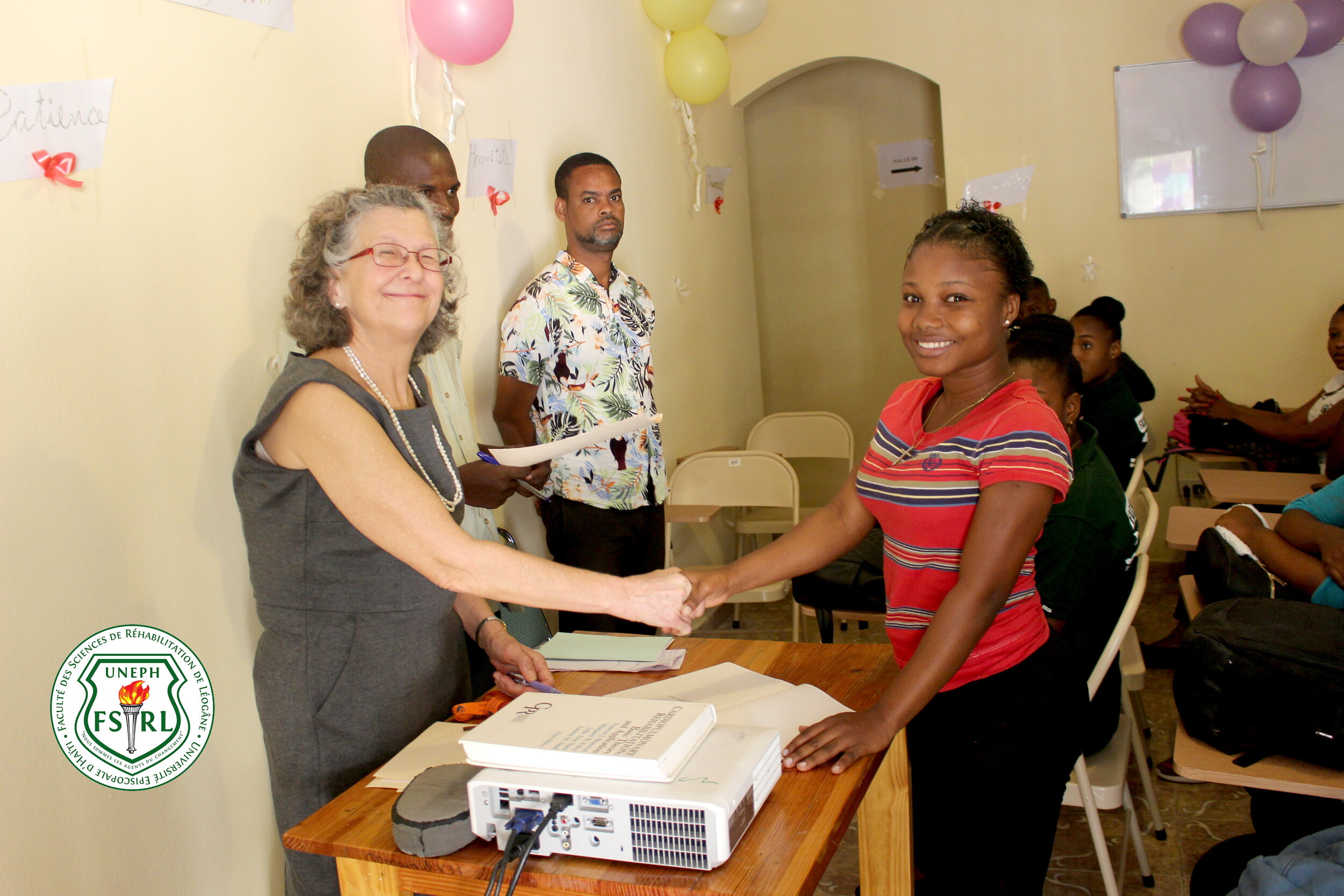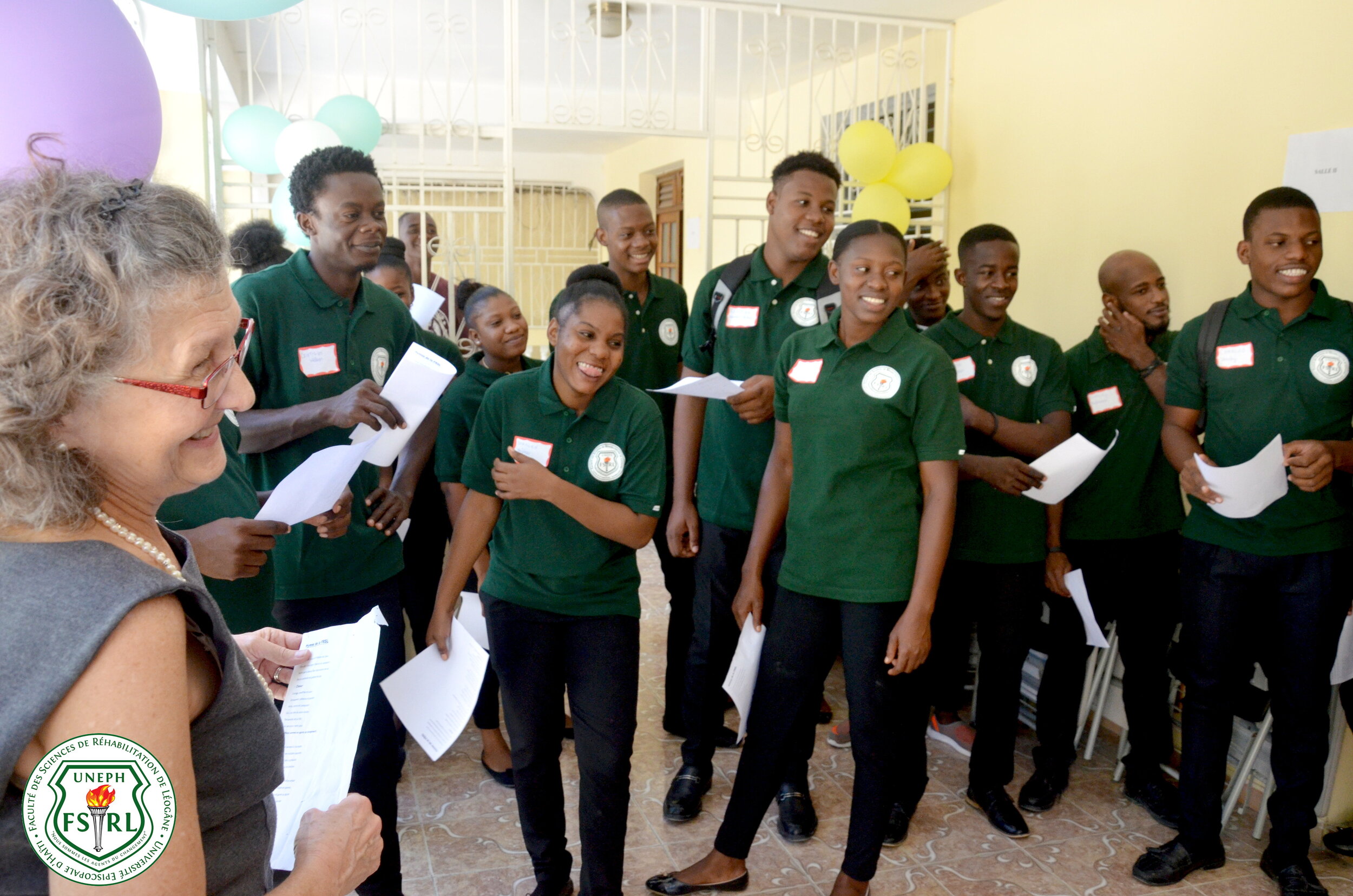Our Impact
We believe success is measured by the impact we make in the communities we serve and the lives we are able to touch. With that, we’ll let our students, patients and volunteers speak to how HRF has impacted their lives.
Click ONE OF THE FIRST FOUR IMAGES BELOW TO LEARN MORE ABOUT HOW WE’RE MAKING AN IMPACT.
FAQs
DOES HAITI NEED THERAPISTS?
YES !
Haiti needs Haitian therapists who speak Haitian Creole and know how to understand the relationship of culture to perceptions of disability.
The World Health Organization estimates that Haiti, as a low-resource country, has between 10% and 18% of its population living in situations of handicap. The population of Haiti is roughly 11 million: which means that between 1.1 million and 1.8 million people live in handicapped situations. These can be triggered by birth differences, consequences of infectious disease, stroke, and diabetes, but also by the all too frequent natural catastrophes. Haiti, the western third of the island of Hispaniola, is over an earthquake fault and in the part of the Caribbean most often hit by hurricanes. The consequences of physical injuries such as amputation, head injury, and spinal cord injury all too often result in isolation and limitation, barriers to a full life.
Mental Health: Life in Haiti at this time is stressful. Haitian citizens feel this deeply. The factors of stress and often heartbreak, as social and political challenges are high, take their own toll. People in Haiti very much appreciate the opportunity for therapy to promote mental health.
Haitian Government response
Even before the earthquake of 2010, the government of Haiti instituted a cabinet-level position for the Bureau for integration of persons with handicaps, BSEIPH. The first secretary of state in this role was Dr. Michel Péan who has taught at our school; the second was Dr. Gerald Oriol Jr., who is the patron of the FSRL class of 2020. There is a law (2012) mandating universal accessibility in Haitian society.
At this time rehabilitation is not recognized by the Haitian government as an essential pillar of health. FSRL-UNEPH and UNIFA (University of the Foundation of Dr. Aristide), SoHaPh (Society of Haitian Physiotherapy), AHE-HAOT (Association of Haitian Occupational Therapy), and H + I (Humanity plus Inclusion) are working periodically to prepare the dossier for the professions of rehabilitation. A law that recognizes rehabilitation, along with medicine, nursing, and pharmacy, would provide for licensure of OT (ergotherapy) and PT (physiotherapy). This culminating step will need to wait for the reconvening of Parliament for normal business items.
The main challenges are: vulnerability of the physical and human environment, dependence on international assistance, poor access to quality health services, insufficient health information and monitoring systems, prevention and control of Non-Communicable Diseases, development of activities to strengthen maternal and child health care, and the limited resilience of the health sector to respond to health emergencies and natural disasters.
WHY THE EPISCOPAL UNIVERSITY, AND WHY is this a good time to grow this academic program?
The Episcopal Church, Diocese of Haiti, Province 2, has had a strong presence in Haiti since 1861. The clergy of the Diocese are Haitian. Health care and literacy are hallmarks of the Episcopal Church in Haiti, with 254 schools, 2 hospitals, and 13 clinics - serving numbers of people well beyond those who are members of the denomination. The Episcopal University of Haiti (called UNEPH, using the first letters of the French title) offers twelve programs, on five campuses. The Episcopal Church in Haiti has taken a leading role in the integration of persons with disabling conditions since 1945 when the first school in Haiti for children with blindness, deafness, and/or physical challenges was founded by a nun from the Episcopal Order of St. Margaret.
The success of UNEPH’s academic nursing programs at the Léogâne campus (called FSIL, using the first letters of the French title) was the inspiration for beginning these new OT & PT degree programs at this time. In 2005, UNEPH admitted students to the first four-year bachelor’s degree program in nursing in Haiti. The first nurses graduated in 2009. There are now well over 140 FSIL graduates with BSN degrees. There is more than one cohort with a master’s degree, and 90 to 95% of them are working in Haiti.
The Occupational and Physical Therapy programs at FSRL-UNEPH opened in 2015. FSRL now has a student body of 78 students. OT and PT students do their fieldwork in rural areas as well as in Port-au-Prince.
Thirty-one students have now graduated. Non-Governmental Organizations in all parts of Haiti have already hired all of the Occupational and Physical Therapists who have graduated from FSRL.
How much money is needed?
Annual expenses for rent, utilities, supplies, vehicles, gas, salaries for Haitian staff, technological connections, and the Haitian professors who teach first-year courses (which consist of general health studies and basic sciences), add up to over $140,000 . Fortunately, the costs are not higher than that, due to the strong and generous presence of volunteer professors for the professional courses in the second, third, and fourth years.
Where the funds come from: a little explanation.
In Haiti, academic departments pay a fee to help support the main university. In Haiti, all Episcopal institutions also pay a fee to help support the Episcopal Diocese. This is the opposite of the situation in the U.S., where the direction of flow of funds is from the university or diocese to the academic program.
Students pay tuition, helped in about 1/3 of cases by scholarships.
· All of our funds beyond those received from tuition are raised from abroad by our volunteer Board, the Haiti Rehabilitation Foundation.
· Happily, we have received grants for technology equipment and for training sessions for clinical formation through our relationship with Université de Sherbrooke and the Canadian government.
· We received a grant for faculty lodging from USAID, an agency of the US government, in 2017 and 2018.
· We have received grants from US Episcopal churches and dioceses too.
How much it costs per student
Tuition, room and board, and supplies including technology for one student cost the FSRL program over $6000 per year. Students are asked to pay approximately $2,400 per year: that is the sum of tuition and other fees. About half of our students can pay their own way. As the numbers of students increase, the need for sponsorships to help the bright students who come from impoverished backgrounds is also growing.
Additional Sources of Funding
We have applied for funding from the USAID: American Schools and Hospitals Abroad, for classrooms and dorm space. The hope is to build on land that is owned by the Episcopal Diocese of Haiti, and to inaugurate a partnership for construction with the medical school of UNEPH.
Two U.S. universities have written research grants in collaboration with the OT and PT faculty and students in order to find and document appropriate practices for developing countries. The experience of providing rehabilitation in Haiti, especially in rural areas, will be useful as a resource for other countries with similar healthcare provision challenges.
What comes next?
Three of our students are now pursuing graduate school degrees. There are two students in Canada and one DPT student working toward a DPT through an online program in the U.S.
In the long run, FSRL expects the OT and PT graduates to be able to continue their studies at the master’s level for these professions. The goal is to develop Haitian faculty, with graduate degrees, as quickly as possible. These students will then take their place as contributors in the international rehabilitation community.

